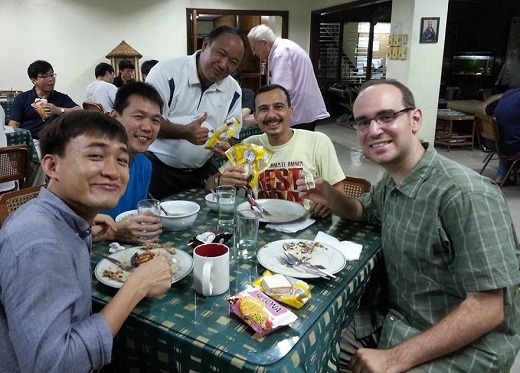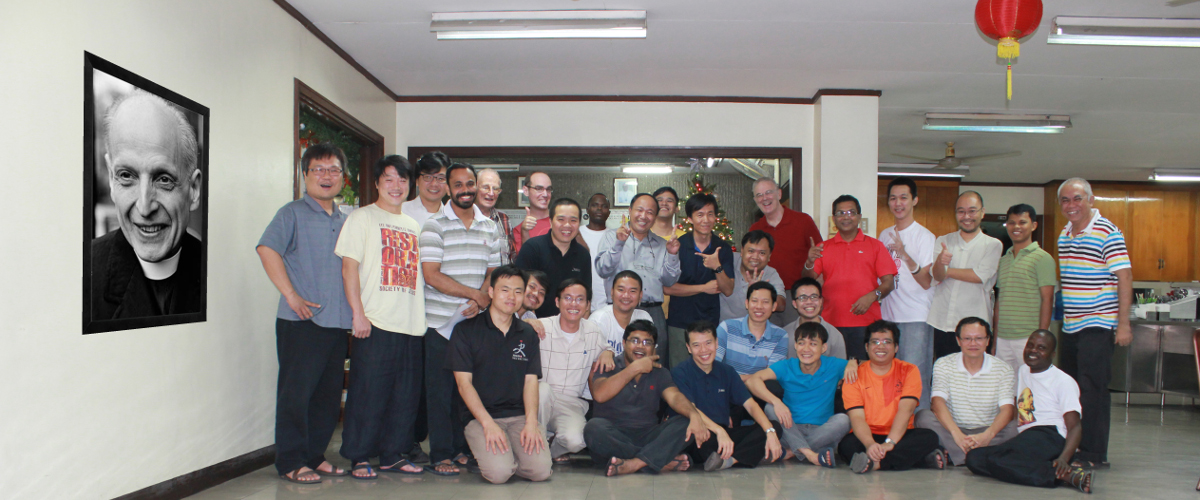American Jesuit scholastic David Romero began his Regency in the Philippines, working with Casa Bayanihan and living in the Arrupe International Residence where the community comprises Jesuits of 15 nationalities. His year in AIR left him with a profound sense of gratitude to God for giving him and the others in the community the chance to share their lives together and for what he has learned from these relationships. He shared this reflection with us just before he returned to the United States to continue his Regency, teaching at Bellarmine College Preparatory in San Jose.
I was so grateful and excited when I found out that I was being sent to the Philippines to work with Casa Bayanihan for my first year of Regency. I grew up in Los Angeles with many Filipino friends, fell in love with the culture, and dreamed of eating delicious mangoes, and now I would have the chance to live in the Philippines for one year! And God’s bountiful generosity did not stop there.
There is a saying that if you give God an inch, he will give you a mile. God’s mile has led me in many surprising ways (as is God’s usual MO [modus operandi]) this year. One of those ways along the mile was to Arrupe International Residence (AIR). I love to travel and experience other cultures, and so was immediately drawn to living in this community. I never would have thought, however, that I would have the chance to live with brother Jesuits from all over the world (15 different countries represented!) so early on in my formation.

The initial joys of living at Arrupe were immediate and definite: I got to make a lot of Jesuit friends from various countries, hear different languages spoken (even learn our fondly called “Arrupe English”), and taste the variety of Southeast Asian cuisine. I celebrate and am grateful for these aspects of my year in Arrupe. However, I am more moved by the deeper grace I witnessed beneath the surface of those moments.
As Fr Adolfo Nicolás SJ [Superior General of the Society of Jesus] reminds us, God always invites us to greater depth. As I reflect more deeply about these new friendships and their diversity, I am in absolute awe. I am in awe and moved by how the Spirit has reached out and called each Jesuit in my community – in their diverse backgrounds, cultures, and personal histories – to this life, and that this is the same Spirit that has been labouring to draw all nations into one body.
I have been blessed this year to listen to the particular vocation stories of my brother Jesuits, as well as other stories about the many graces and challenges (also incredibly varied) each of them has faced in this life. As I listened to these stories, got to know them better, and shared my own story, I kept thinking about the Parable of the Sower. At first I thought, “Wow, this sower is pretty incompetent throwing seed on infertile and rocky ground.” Over time, what I became more struck by in this parable was how God is illustrated as a lover of diversity. As the sower, God really wants every place to get some seeds. Similarly, I have felt this truth among us in Arrupe. In our complex diversity, God meets and loves each of us, and gives us a chance to grow and bear fruit, each given some seeds. And this does not happen just once, but over and over again.
And so I leave Arrupe with a profound sense of gratitude to God for giving us the chance to share our lives together and for what I have learned from these relationships. In addition, I am moving on in immense awe of the generosity of my brother Jesuits and lay staff of Arrupe who strive to love others not just from their strength (when it is easier), but also their weakness (moments when it is more difficult to love). Leaving them is hard, but this difficulty is a sign for me that love has worked this past year, one that will make our reunion – God-willing – all the more joyful.
Related story: Casa Bayanihan: Education rooted in reality


